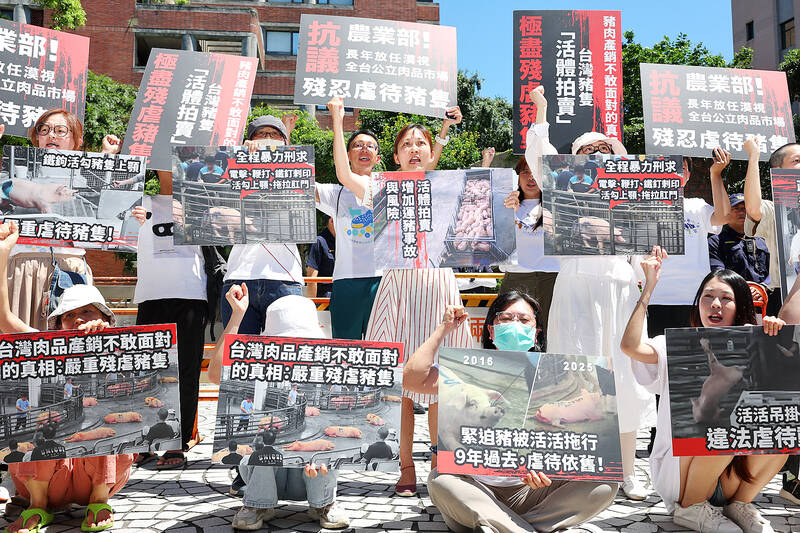About 6 million pigs are treated violently every year in Taiwan before their arrival at slaughterhouses, animal rights groups said yesterday, urging the Ministry of Agriculture to establish a pork grading system to replace “inhumane” live pig auctions.
While in Japan, South Korea and most Western countries pigs are transported from hog farms directly to nearby slaughterhouses, in Taiwan they travel long distances from farms to auction houses and then to slaughterhouses, Environment and Animal Society of Taiwan deputy chief executive officer Chen Yu-min (陳玉敏) said.
Pigs are forced to walk through narrow passages at auction houses to be inspected by bidders, but they often slip on steel plates and bump their snouts, Chen said.

Photo: CNA
At least 25 to 30 pigs collapse due to porcine stress syndrome (PSS) at auction houses every day, she said.
Auction house staff also force them to move by hitting them with metal rods or batons, dragging them by placing iron hooks in their upper jaw or anus, or kicking them, and tattoo them to mark transaction information, she said.
New Taipei City has the largest auction volume in the nation, she said.
Given that most hog farms are in southern Taiwan, live pigs travel up to 230km from Yunlin County — the largest pork farming area — to be auctioned in northern Taiwan, with trucks often providing no shade, she said.
As they are exposed to extreme temperatures in summer and winter, many pigs die from heatstroke or PSS during the journey, Chen said, adding that it is not uncommon that a pig falls out of a truck and lies on a freeway.
Pigs are also forced to fast for at least 24 hours before their journey to prevent them from throwing up, she said.
The ministry’s data on transportation insurance claims show that about 10,000 pigs die during transportation every year, she said.
Systemic violence against pigs not only increases public health risks but also harms animal welfare in contravention of articles 6 and 10 of the Animal Protection Act (動物保護法), she said, calling for a systemic reform by the ministry.
The ministry should end the “barbaric” live animal auction system and establish a carcass grading mechanism jointly with local governments to provide objective, transparent ratings and prices for buyers to make transactions based on carcass quality data, such as fat-to-lean meat ratio and muscle quality, Chen said.
The live animal auction system stands for “high carbon emissions, low efficiency,” Sustainable Healthy Diets Research Institute spokeswoman Chang Chia-pei (張家珮) said, citing UN data as showing that 8 to 10 percent of global carbon emissions result from such production and transportation of commercial animals.
The ministry should propose the timeline of replacing live pig auctions with a carcass grading system to fulfill its environmental responsibilities, Chang said.
The ministry has received the petition and would properly handle the issue, Department of Animal Industry official Chen Yi-tzu (陳宜孜) said.

The manufacture of the remaining 28 M1A2T Abrams tanks Taiwan purchased from the US has recently been completed, and they are expected to be delivered within the next one to two months, a source said yesterday. The Ministry of National Defense is arranging cargo ships to transport the tanks to Taiwan as soon as possible, said the source, who is familiar with the matter. The estimated arrival time ranges from late this month to early next month, the source said. The 28 Abrams tanks make up the third and final batch of a total of 108 tanks, valued at about NT$40.5 billion

Two Taiwanese prosecutors were questioned by Chinese security personnel at their hotel during a trip to China’s Henan Province this month, the Mainland Affairs Council (MAC) said yesterday. The officers had personal information on the prosecutors, including “when they were assigned to their posts, their work locations and job titles,” MAC Deputy Minister and spokesman Liang Wen-chieh (梁文傑) said. On top of asking about their agencies and positions, the officers also questioned the prosecutors about the Cross-Strait Joint Crime-Fighting and Judicial Mutual Assistance Agreement, a pact that serves as the framework for Taiwan-China cooperation on combating crime and providing judicial assistance, Liang

A group from the Taiwanese Designers in Australia association yesterday represented Taiwan at the Midsumma Pride March in Melbourne. The march, held in the St. Kilda suburb, is the city’s largest LGBTQIA+ parade and the flagship event of the annual Midsumma Festival. It attracted more than 45,000 spectators who supported the 400 groups and 10,000 marchers that participated this year, the association said. Taiwanese Designers said they organized a team to march for Taiwan this year, joining politicians, government agencies, professionals and community organizations in showing support for LGBTQIA+ people and diverse communities. As the first country in Asia to legalize same-sex

MOTIVES QUESTIONED The PLA considers Xi’s policies toward Taiwan to be driven by personal considerations rather than military assessment, the Epoch Times reports Chinese President Xi Jinping’s (習近平) latest purge of the Chinese People’s Liberation Army (PLA) leadership might have been prompted by the military’s opposition to plans of invading Taiwan, the Epoch Times said. The Chinese military opposes waging war against Taiwan by a large consensus, putting it at odds with Xi’s vision, the Falun Gong-affiliated daily said in a report on Thursday, citing anonymous sources with insight into the PLA’s inner workings. The opposition is not the opinion of a few generals, but a widely shared view among the PLA cadre, the Epoch Times cited them as saying. “Chinese forces know full well that